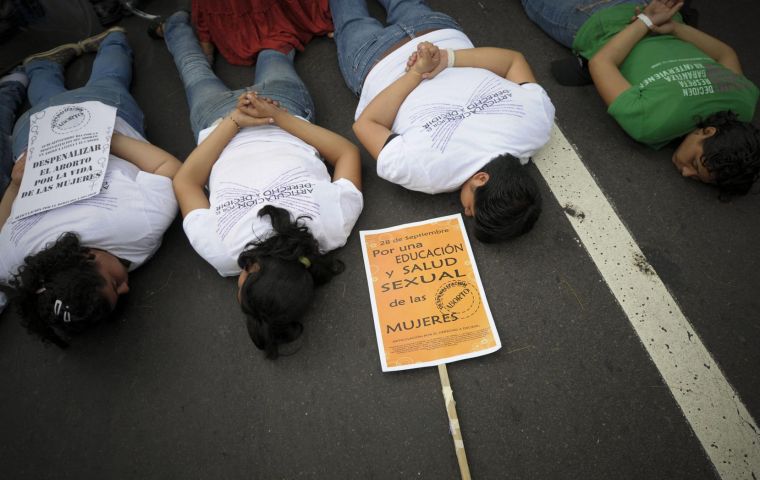MercoPress. South Atlantic News Agency
Abortion: Salvadorean woman sentenced to 50 years
 Pro-abortion groups will appeal the woman's conviction
Pro-abortion groups will appeal the woman's conviction A woman in El Salvador has been handed down a 50-year jail sentence for having had an abortion, it was reported Monday. It was the first time that the maximum penalty has been applied. Pro-abortion groups have pledged to appeal the ruling.
Lesly Lisbeth Ramírez has been prosecuted for abortion and convicted on June 29 of aggravated homicide by a court in San Miguel, 135 kilometers east of the capital.
“The Salvadoran state once again continues to be cruel to women who have had neither the right nor the conditions to defend themselves,” said Morena Herrera, who heads the collective that defends women's rights in El Salvador, in a press release.
Salvadoran law criminalizes all forms of abortion, including therapeutic abortion, and punishes both the women and the doctors who perform them. If found guilty, sentences range from two to eight years. However, in many cases the crime is changed to aggravated homicide due to the victim's relationship and women can be sentenced to between 30 and 50 years in prison.
Ramírez's conviction was based on the evidence presented in the trial by the prosecutors and the forensic report that determined the cause of death of the baby as “throat-slitting due to a contusive-cutting type wound produced with a sharp weapon.”
According to the Prosecutor's Office, the young woman, who lived in a rural area in the east of the country, “hid her pregnancy from her relatives and had an out-of-hospital delivery in which she gave birth to a girl who was born alive and who, through the forensic examination, was estimated to be between 37 and 40 weeks of gestation.”
However, the feminist collective argues that the young woman, who at the time was 19 years old, had a low level of school education and no comprehensive sexual education and “was unaware of what was happening in her body and on June 17, 2020, at 9:30 at night, she had an obstetric emergency at home, felt the desire to defecate and unknowingly began labor.”
The young woman went to the bathroom and had a precipitous delivery. According to the pro-abortion groups, the young woman “felt that something was coming out, it was dark and she could not see what she was expelling.” They add that she got scared and panicked, “everything was confusing since she was a first-time mother”.
Family members called the police emergency services to transport her to a hospital, where she was arrested and initially charged with abortion. Ramirez is the third of seven siblings in a family living in extreme poverty that has no access to drinking water or electricity and makes a living out of agricultural work. Lesly only attended the seventh grade and took on household chores and the care of her four younger siblings.
The groups assure that the legal process against the young woman was biased and that the judge did not admit evidence that proved her innocence, also casting aside “the gender violence to which Lesly had been subjected, or the psychological expertise that suggested a psychiatric study.”
Herrera told the AP that this sentence was contrary to the ruling of the Inter-American Court of Human Rights (IACHR) in the “Manuela vs El Salvador” case. In November 2020, the IACHR declared the Salvadoran State responsible for violating the rights of a woman identified as “Manuela” who was arrested in 2008 and after being sentenced to 30 years died in prison, leaving her two children orphaned.
The collective claims that “Manuela” was denied medical attention while in detention and the IACHR condemned the Salvadoran State for the case and demanded that it not persecute or criminalize women who face obstetric emergencies.
Since December 2021, the Salvadoran government has commuted the sentences of nine women who suffered obstetric emergencies and were prosecuted for abortion.
El Salvador is one of four Latin American countries that ban abortion without exceptions, along with Nicaragua, Honduras, and the Dominican Republic. Human rights organizations have demanded that the Salvadoran government repeal the law prohibiting abortion but to no avail.
(Source: Infobae)




Top Comments
Disclaimer & comment rulesCommenting for this story is now closed.
If you have a Facebook account, become a fan and comment on our Facebook Page!